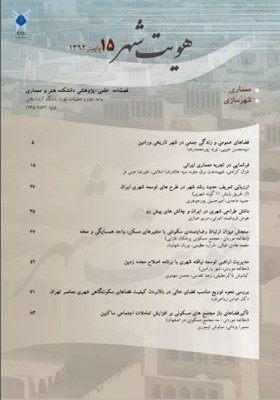سنجش میزان ارتباط رضایتمندی سکونتی با متغیرهای مسکن، واحد همسایگی و محله (مطالعه موردی : مجتمع مسکونی پزشکان فارابی)
محورهای موضوعی : معماریمحمد هادی غیائی 1 , شراره عظیمی 2 , پویان شهابیان 3
1 - دانشجوی کارشناسی ارشد برنامهریزی شهری و منطقهای دانشگاه هنر، تهران، ایران
2 - دانشجوی کارشناسی ارشد برنامهریزی شهری و منطقهای دانشگاه هنر، تهران، ایران
3 - استادیار گروه شهرسازی دانشگاه آزاد واحد تهران مرکز، تهران، ایران
کلید واژه: رضایتمندی سکونتی, سنجش میزان رضایتمندی, مدل آمریگو, واحد مسکونی, واحد همسایگی و محله,
چکیده مقاله :
نظریه رضایتمندی سکونتی بر پایه تفاوت بین زندگی واقعی خانوادهها و آرزوهای آنها از شرایط مسکن و محیط اطراف آن شکل گرفته است. بنابراین مطالعه سعی دارد تا با بررسی تعاریف و مدلهای مختلف ارائه شده در مورد رضایتمندی سکونتی، عوامل تاثیرگذار بر آن را در ارتباط با متغیرهایی همچون مسکن همراه با فهرستی از شاخصهای جزییتر با توجه به تجربه کشور مالزی و آزمایش آن در نمونه موردی، تدوین نماید. پژوهش از نوع نظری کاربردی بوده و الگوی مفهومی آن بر اساس روش تحقیق تحلیلی- توصیفی است. نتایج بررسی ها نشان می دهد عوامل مهم تاثیرگذار بر میزان رضایتمندی سکونتی شامل ویژگی افراد ساکن، عوامل اجتماعی، فرهنگی، اقتصادی و کالبدی مسکن و جامعه و از همه مهم تر هم راستا بودن نیازها و آرزوها می باشد. همچنین با توجه به اشتراک برخی از متغیرهای تاثیرگذار بر میزان رضایتمندی، بسیاری از این عوامل از ویژگیهای فرهنگی -اجتماعی کشور و جامعه مورد مطالعه تبعیت میکنند.
The researchers of residential environments pay attention to three key factors of choice, satisfaction, and behavior. Among these factors, residential satisfaction is considered an important criterion affecting the life of people and in assessing the quality of the residence. According to the results of different researches, the residential satisfaction theory has been formed around the difference between real life of families and what they wish as conditions and situation of residential units and their surrounding areas. In other words, the base and main essence of this theory is paying attention simultaneously to wishes, needs, and desires of the residents. Present study tries to review existing different theories and definitions and enumerate the important factors affecting the residential satisfaction which generally speaking consists of housing, neighbor units and neighborhood along with a list of less important variables and indexes. Then, Maria Amerigo and House Choosing Conceptual Model for determining the residential satisfaction questionnaire studied and after dealing with the objective and subjective features of residing area, the needed general topics for designing residential satisfaction questionnaire are explained. The world experience of Malaysia is analyzed and then, based on resulted variables, the degree of residential satisfaction of residents of Farabi Physicians’ Residential Complex is given in frame of three categories, namely, housing, common parts, and residential neighborhood. Finally, conclusions are presented and based on the conclusion; a combined definition of residential satisfaction is presented. The conceptual model is based on analytical, descriptive, and experimental methodology. Its content structure too consists of reviewing different presented definitions, theories and models and analyzing some cases related to residential satisfaction, ‘distributing questionnaires between 120 families residing in Farabi Physicians’ Residential Complex, analyzing the gathered information by using SPSS software, and using the gathered information for determining the factors and variables which are effective in explanation of a suitable definition of this concept. The type of research is fundamental of theoretical-experimental category. Furthermore, it must be noted that in section dealing with world experiment, the residential satisfaction resulted from low-priced residences of Malaysia has been analyzed for finding out other general and trivial variables which impact the degree of residential satisfaction, in selecting the studied case, intentionally a complex has been chosen that its residents ate enjoying social welfare. The conclusion will show the critical factors which affect the degree of residential satisfaction in the view of Farabi Physicians’ Residential Complex (objective and subjective perception of the residents) and will point at instances which may be neglected in questionnaires and library studies. According to the results, the important factors which affect the degree of residential satisfaction include individual and behavioural features of residing individuals, simultaneous attention to subjective and objective features of surrounding environment, social, cultural, and economic factors, physical features of houses and society, particulars of residential unit, neighbor unit, and surrounding area, and most importantly, the wishes and needs. Considering the commonality of some variables which affect the residential satisfaction degree, many of these factors follow the socio-cultural features of the studied country and society.
_||_


